You can easily find inexpensive flute lessons for kids that ignite a passion for music! Check out local community centers and music schools, which often offer budget-friendly options. Group classes can be a fun way for your child to learn alongside peers. If you prefer flexibility, many online platforms provide engaging video tutorials at various price points. Don't forget to explore sliding scale fees with private instructors or look for discounts on multiple lessons. With the right resources and a supportive environment, your child's musical journey can be both enriching and affordable. There's much more to discover!
Key Takeaways
- Research local music schools and community centers for budget-friendly flute lessons specifically designed for kids.
- Join group classes to enjoy a collaborative learning experience at a lower cost.
- Explore online platforms offering affordable video tutorials and interactive flute lessons tailored for children.
- Look for private instructors who offer sliding scale fees or discounts for multiple lessons.
- Utilize flute method books and engaging apps for self-paced practice at home.
Benefits of Learning the Flute
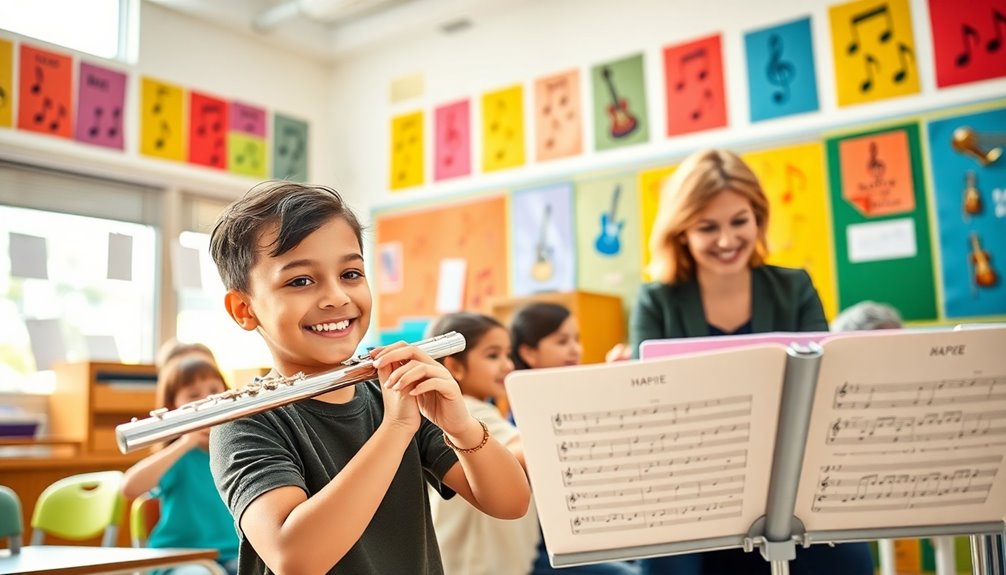
Learning the flute offers countless benefits that can enrich your child's life in various ways. First and foremost, the musical benefits of playing the flute are immense. Your child will develop not only a deep appreciation for music but also skills that enhance creativity and self-expression. As they master the instrument, they'll find joy in creating beautiful melodies and harmonizing with others. These experiences foster a sense of belonging, especially when playing in groups or ensembles.
Beyond the musical aspect, learning the flute considerably contributes to your child's cognitive development. Research shows that music education can improve memory, attention, and problem-solving skills. As your child learns to read music, interpret rhythms, and practice regularly, they'll enhance their ability to focus and think critically. These skills transfer to other academic subjects, making learning in school more accessible and enjoyable.
Encouraging your child to learn the flute also promotes discipline and perseverance. Practicing consistently teaches them the value of hard work and dedication, essential traits that will serve them well throughout life. Additionally, starting with a standard C flute provides a balanced tone, making it easier for beginners to create beautiful music.
Furthermore, playing the flute can lead to social opportunities, as they connect with fellow musicians and participate in community events. This sense of community fosters friendships and support networks that enrich their childhood experience.
In short, investing in flute lessons for your child is a decision that can yield lifelong benefits, nurturing their musical talents while enhancing cognitive skills and social connections. You'll be giving them a gift that lasts a lifetime.
Finding Affordable Lessons
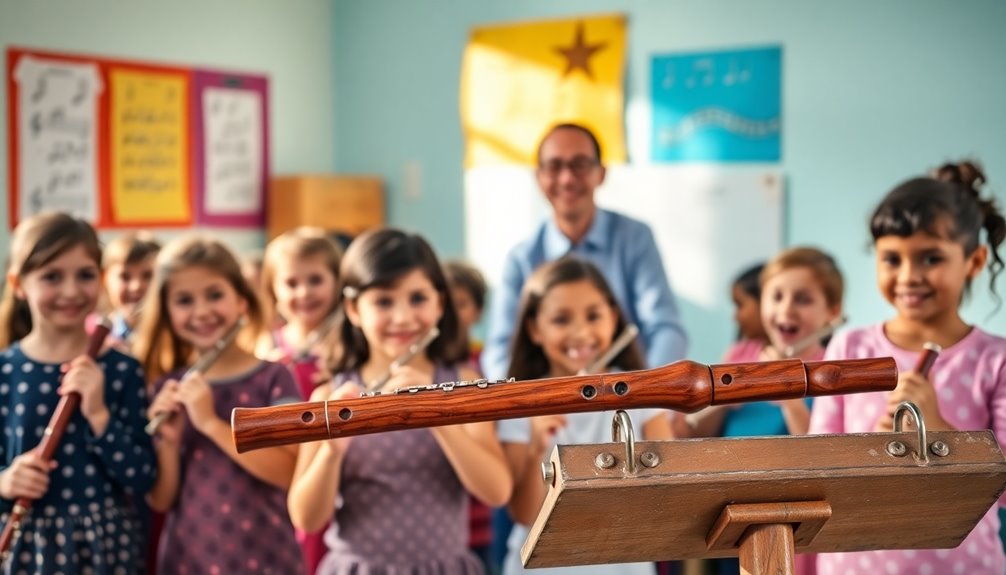
Finding affordable flute lessons can be an exciting journey for both you and your child. It's a chance to explore music together while keeping your budget in check. Start by researching local music schools or community centers, which often provide budget-friendly options.
These institutions frequently offer group classes, making it a fun way for your child to learn alongside peers, enhancing their sense of belonging.
Another option is to look for private instructors who advertise competitive lesson pricing. Many aspiring teachers are enthusiastic to gain experience and may offer lower rates.
Don't hesitate to ask about sliding scale fees or discounts for multiple lessons. This way, you can guarantee your child gets quality instruction without breaking the bank.
Online platforms are also a treasure trove of affordable resources. Websites offering video tutorials or online classes can cater to various budgets, allowing your child to learn at their own pace.
Check out community forums or social media groups where parents share their experiences and recommendations for cost-effective lessons.
Finally, consider purchasing used instruments or renting one to minimize expenses while your child learns the basics. Additionally, choosing a reputable brand flute can enhance your child's learning experience and ensure they have a reliable instrument to practice on.
With a little creativity and research, you'll find the perfect balance of quality and affordability. Remember, the goal is to foster a love for music in your child, and with the right lessons, you can make that dream a reality without stretching your finances.
Online vs. In-Person Classes

As you explore options for flute lessons, you'll soon encounter the choice between online and in-person classes. Each option has its unique benefits, and understanding them will help you choose the best fit for your child's learning style and needs.
Online classes offer incredible flexibility. You can schedule lessons at times that work best for your family, whether that's after school or on weekends. This convenience can make it easier to stick to a practice routine, especially if your child has a busy schedule. Plus, with the vast array of online resources available, your child can access various teaching styles and methods that suit them.
On the other hand, in-person classes provide valuable personal interaction. There's something special about being in the same room as a teacher, where your child can receive immediate feedback and encouragement.
These face-to-face connections can help foster a sense of belonging, making learning more enjoyable and engaging. Your child might also benefit from watching their teacher's demonstrations up close, which can enhance their understanding of technique. Additionally, choosing a suitable flute, such as a standard silver-plated flute, can significantly impact your child's learning experience.
Ultimately, the decision between online and in-person classes depends on your child's preferences and learning style. By weighing the advantages of online flexibility against the richness of personal interaction, you'll be well-equipped to find the right fit.
Whether you choose online or in-person lessons, the most important thing is to keep the joy of music alive for your child as they begin their flute-playing journey.
Recommended Resources for Kids
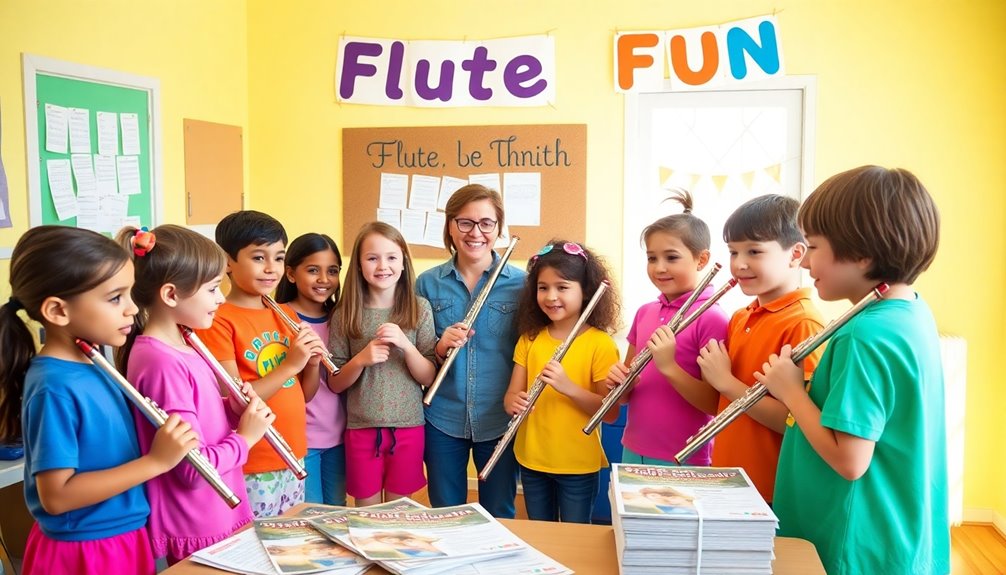
What resources can truly enhance your child's flute learning experience? Finding the right tools can make all the difference in keeping your child engaged and excited about playing. Here's a list of some recommended resources that can support their journey:
– Flute Method Books: Choose books that cater to your child's skill level. Look for ones with clear instructions, engaging exercises, and fun pieces to play.
Method books can provide a structured learning path that helps build confidence and technique.
– Interactive Apps: In today's digital age, Interactive Apps offer fantastic ways to practice.
These apps often include games, exercises, and play-along tracks that can motivate your child to practice regularly. They can also track progress, making practice feel rewarding and fun.
– Online Video Tutorials: YouTube and other platforms have countless videos featuring flute lessons, tips, and performances.
Watching skilled players can inspire your child and expose them to different styles and techniques. Encourage them to explore and find tutorials that resonate with their learning style. Additionally, consider introducing them to materials that include information on proper hand positioning, which is crucial for developing good technique.
Sample Lesson Plans

With the right resources in hand, you can create a structured and enjoyable learning experience for your child. Sample lesson plans can be a great starting point to guarantee each session is engaging and productive.
Begin with a warm-up that includes creative exercises, such as breathing techniques or simple finger exercises. This helps your child relax and focus, setting a positive tone for the lesson.
Following the warm-up, introduce a fun activity, like a short and lively game where your child identifies notes or rhythms on the flute. This won't only reinforce what they've learned but also inject some excitement into the learning process.
Next, you can explore a new concept, such as learning a specific scale or a fundamental technique. Use music that your child enjoys to make this part of the lesson more relatable. Incorporate creative exercises that allow them to practice the new skills, perhaps by playing along with a favorite song or composing a short melody together. Additionally, encourage them to focus on their breath control, which is vital for mastering the flute.
To wrap up the lesson, encourage your child to share their thoughts on what they enjoyed or found challenging. This reflection fosters a sense of belonging and helps you tailor future lessons to their interests.
Tips for Parents
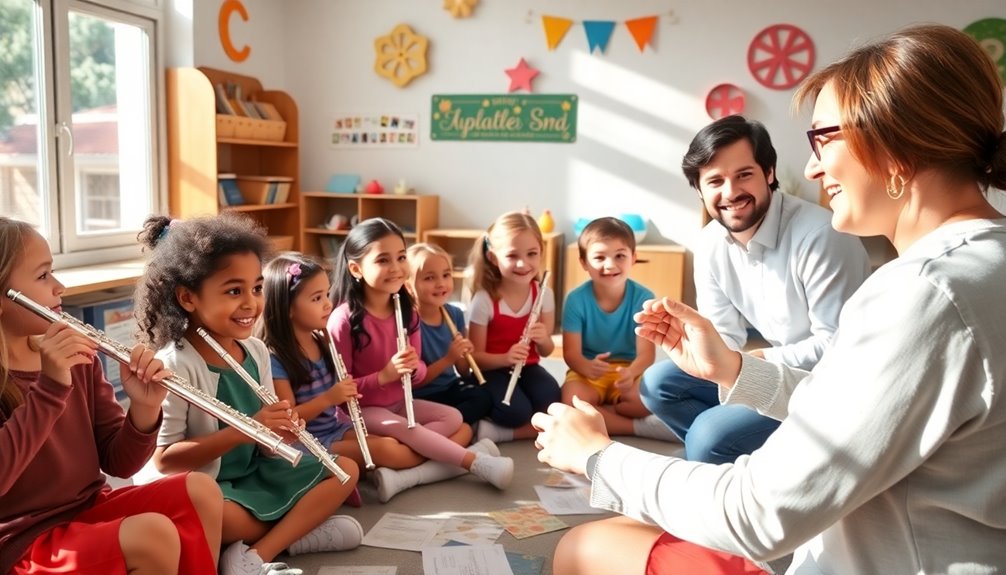
Supporting your child's musical journey can be a rewarding experience filled with joy and discovery. As a parent, your involvement is essential in nurturing their passion for the flute. Here are some tips to help make this experience even more enriching for both of you:
- Encourage Regular Practice: Set a routine that works for your family. Consistency is key, so try to establish a specific time each day for practice.
- Attend Lessons Together: Being present during lessons can foster a deeper connection. It allows you to understand what your child is learning and how you can help at home.
- Celebrate Achievements: Whether it's mastering a new piece or improving their technique, celebrate those milestones! This recognition boosts their confidence and keeps them motivated.
When it comes to lesson scheduling, communicate openly with your child about what times work best for them. Make sure their schedule aligns with their other commitments, so they don't feel overwhelmed.
Your support can make all the difference. Show interest in their progress, ask about their lessons, and listen to them play. This kind of parent involvement not only strengthens your bond but also reinforces their love for music.
Additionally, consider investing in a quality beginner flute, such as the Yamaha YFL-222, which is known for its durability and tone quality.
Local Community Programs
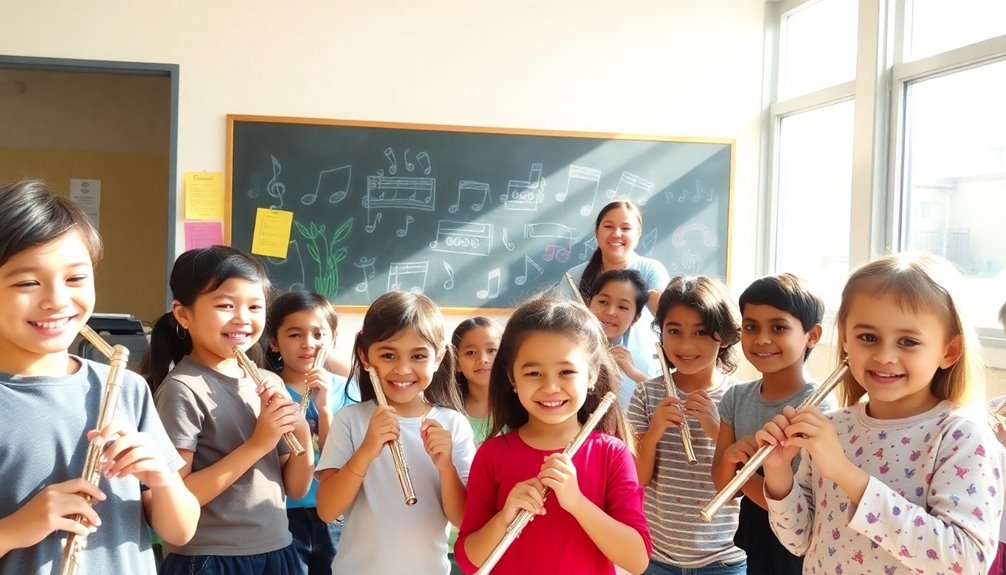
Engagement in local community programs can greatly enhance your child's flute learning experience. These programs often provide an enriching environment where your child can connect with peers who share a passion for music.
By participating in community outreach initiatives, your child can explore various musical genres, participate in workshops, and even perform at local events. This not only boosts their confidence but also allows them to experience the joy of making music in a supportive setting.
Many local community centers and music schools offer affordable flute lessons designed specifically for kids. These programs prioritize music education, ensuring your child receives quality instruction tailored to their skill level.
Being part of a community program means your child won't feel isolated in their learning; instead, they'll forge friendships and create lasting memories with fellow young musicians.
Moreover, these programs often have access to resources that can further enhance your child's learning. This includes guest musicians, masterclasses, and opportunities for group performances. Additionally, these programs often provide instruments made from durable materials to ensure that all students have access to quality equipment.
Your involvement as a parent can also deepen your connection to the community, allowing you to support your child's passion while meeting other families who share your values.
Instruments and Supplies

When it comes to starting flute lessons, having the right instruments and supplies is vital for your child's success and enjoyment. A good-quality flute can make a world of difference in their learning experience, as it allows for better sound production and easier playability.
You'll want to take into account a few key items to guarantee your child is well-equipped for their musical journey.
Here are some important accessories you should have:
- Flute cleaning rod and cloth: Proper flute maintenance is essential. Regularly cleaning your child's flute helps keep it in top shape and guarantees a clearer sound.
- Mouthpiece cushion: This small accessory can greatly enhance your child's comfort while playing, making it easier to focus on learning rather than discomfort.
- Music stand: A sturdy music stand supports good posture and helps your child read sheet music easily, creating a more enjoyable practice session.
Investing in these supplies not only sets your child up for success but also shows your support for their musical aspirations. Additionally, a flute cleaning kit can provide a comprehensive solution for maintaining their instrument in optimal condition.
Remember, the right tools can inspire confidence and foster a sense of belonging in their new musical community. Encourage your child to take care of their instrument; this won't only enhance their playing experience but also instill a sense of pride in their instrument.
Encouraging Practice at Home

Practicing at home is essential for your child's progress in flute lessons, and setting up a structured routine can make all the difference. By creating a consistent practice schedule, you help your child develop discipline and build upon what they learn in each lesson. Aim for short, focused sessions rather than long marathons; even 15-20 minutes a day can be incredibly effective.
To encourage your child, incorporate some motivational strategies that make practice feel rewarding. For instance, you could set small, achievable goals each week—like mastering a particular scale or piece. Celebrate these milestones together, whether with verbal praise or a fun treat. This not only boosts their confidence but also reinforces the joy of learning music.
Make practice routines more engaging by introducing variety. You might mix in games or challenges, such as playing along with a favorite song or performing for family members. Creating a supportive environment allows your child to feel comfortable expressing themselves musically.
Additionally, consider involving siblings or friends in practice sessions. Group learning can foster a sense of community and belonging, making the experience much more enjoyable. Encourage your child to share their progress and practice tips with their peers. Incorporating structured practice strategies into their routine can further enhance their learning experience.
Frequently Asked Questions
What Age Is Best to Start Learning the Flute?
When considering the best age to start learning the flute, many educators recommend ages 8 to 10.
At this stage, kids can grasp the instrument's physical demands and enjoy its numerous benefits, like improved focus and discipline.
Starting early fosters a lifelong love for music and builds confidence.
If your child shows interest, don't hesitate! Encouraging them now could lead to a fulfilling musical journey that lasts a lifetime.
How Long Should Practice Sessions Be for Kids?
You might wonder how long practice sessions should be for kids. The secret lies in short practice periods—around 15 to 20 minutes—combined with effective techniques.
This approach keeps their interest alive and builds a solid foundation. As they progress, you can gradually extend the sessions.
Can Kids Learn Flute Without Prior Musical Experience?
Absolutely, kids can learn the flute without any prior musical experience!
Starting fresh offers a fantastic opportunity to build a strong musical foundation. With each note, they'll discover the joy of music and the benefits of playing an instrument, such as improved focus and creativity.
Encouragement and practice go a long way, so celebrate every small achievement together. Your support will make their journey even more rewarding and fun!
What Are the Common Challenges Beginners Face?
Starting your flute journey can feel like stepping onto a tightrope.
You'll face challenges like breath control and finger coordination. At first, it might seem tricky to get your fingers to dance effortlessly while you blow the right notes.
Don't worry, though! With practice, you'll find your rhythm. Every small victory builds your confidence and connects you with fellow musicians.
Embrace the learning process; soon, you'll play beautifully and enjoy every moment!
Are There Group Lessons Available for Kids?
Absolutely, there are group lessons available for kids!
These lessons harness group dynamics to foster a sense of belonging and teamwork. You'll discover that learning in a group setting can be both fun and encouraging, as students support each other through different lesson formats.
Being part of a group not only makes practice more enjoyable, but it also helps kids build friendships while developing their flute skills together.
Conclusion
In the vibrant world of music, your child can flourish with inexpensive flute lessons that reveal their creativity. Picture them holding their gleaming flute, fingers dancing over the keys, producing sweet melodies that fill your home with joy. These lessons not only teach skills but also foster confidence and discipline. As they commence on this musical journey, you'll witness their passion bloom, like a flower reaching for the sun, making every note a step toward a brighter future.






